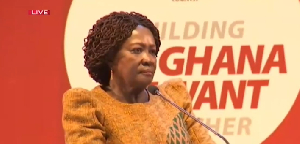Opinions of Monday, 25 April 2011
Columnist: Anim-Mensah, Alexander
Transportation and Communication – Among the Embryos ....
....for Development in Ghana as well as Africa
For a country developing, communication and transportation systems, and its networks are among some of the basic structures to consider for development. In the developed countries, communication and transportation systems are continually improved to support the need of the growing population. However, in Ghana as well as African in general, these are very lacking even in the light of the growing population which makes our development retract rather than move forward in our thoughts of developing. It is worth to point out that communication, transportation and development are interrelated. In addition, communication and transportation are among some of the key basic structures necessary for development. The subsequent paragraphs will throw some light to support the above statements from a very simplistic approach.
In Ghana, communication has improved drastically over the last decades however our transportation is still lacking and not very different from the colonial times. With the influx of the numerous phone companies; communication and information access has improved. Now in the cities it appears that about 2 out of 3 people have access to phones while about 2 out of 4 have internet access including the cafes. However, some inherent reliability problems exists which make consumers always left at the mercy of the poor services by their providers. I believe consumers complaints should not be taken lightly for improvement and consumer protection.
Transportation means include roads, train, air, water, etc. Though, air transport has improved, affordability makes the road the major transportation means. However, most of our roads are plagued with pot holes, narrowness, traffic, no proper networking, pollution from slow moving traffics, no median between opposite traffic, etc. In addition, some of the conditions of our roads hence contribute to accidents, scariness as well as delays.
It is quite surprising to know that within a 12 hour (8 am - 8 pm) working day in Ghana, a mile travel in some of the major cities may a take about an hour while a 100 mile journey will require about 5 hours. However, in the developed countries, a mile and a 100 mile journey may take on the average 2 minutes and 1 hrs 30 minutes, respectively. Comparing the developed and developing countries travel times; about 58 minutes and 3 hrs 30 minutes of productive work are lost for a mile travel in the city and a 100 miles journey respectively in a day. This makes the gap between the developed and developing countries widen by about 44 days (352 hrs) in the city and 160 days (1274 hrs) for a 100 mile journey per year of productivity work loss per person in the above scenario.
In addition, developing countries not having efficient cars, up-to-date efficient petroleum processing technologies or buy petroleum products at exorbitant prices; consume more fuel from our slow moving traffic, pollute our environment and waste productive times as well as money on the road. Moreover, losses from accidents as well as the scares on the roads are unimagined.
Internet has come to stay with us, however slow speed internet surfing/browsing rather waste productive time compared with high speed internet. If it takes about 1 minute verses 20 minutes to download a page; here about 19 minutes productive time is lost. However, if 1% of the population is faced by this challenge in the same time imagined the total productive time loss to a country.
It appears as if from the above simplistic calculation, we in the developed countries are still moving in the opposite direction of development if not matching time whiles the gap widens. As we all already know “time is money” and “time loss can never be regained”. I believe if we consider every process critically we will appreciate the importance, benefits and opportunities that lie in them if we so desire to develop. There are lot more factors that exist other than what is discussed here, however without changing our mind sets we will still be at a development standstill if not retract. I believe systems can be instituted to help us all change our mind sets, attitudes, and be very patriotic.
• Imagine the money and productivity losses if buses, cars, trucks, etc are continually delayed on the road daily.
• Imagine brains and money loss from preventable accidents on our roads in a year.
• Imagine the number of businesses lost from poor communication and transportation systems and networks.
• Imagine the money and productivity losses in a country where the lifestyle and activities are all lateness and delays.
• Imagine a country where little is done on pollution abatement systems.
• Imagine a country with a lot of holidays.
• Imagine a country where nothing is done to cater for the growing population.
• Imagine a country where the government is always responsible for everything.
• Imagine …………….
The achievement of proper transportation and communication systems are not far and hence Ghana should not use the 3rd world categorization as an excuse. But strive to implement better policies and laws to make our transportation, communication systems and others effectively and efficiently to help Ghana stride in its development. I believe if we manage and channel productive time losses (intangible) appropriately, the gains derived can surpass money obtained from International Monetary Funds (IMF) (tangible) at any point in time. I believe with proper education, exposure and knowledge; the achievement of the above will not be politicized but view as a necessary need for development. I believe some basic facilities and infrastructures when available and manage properly could enhance our moving forward. It is our responsibilities to grow Ghana. God bless Ghana.
Alexander R. Anim-Mensah, PhD
Chicago, IL USA
Email- alexraymonda@yahoo.com
Entertainment











